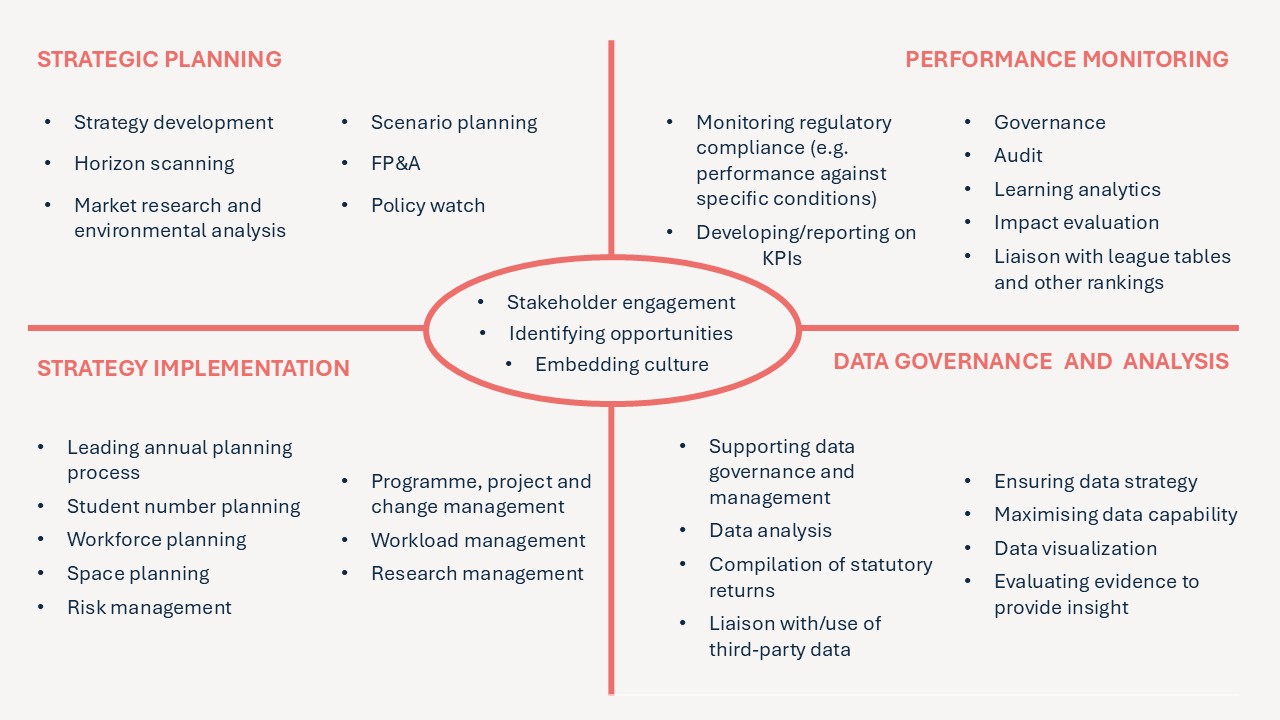HESPA Development refers to our learning and development activity for members. This includes paid-for training and other opportunities which might be free or covered by member subscriptions.
HESPA's Development Committee exists to identify the training and development needs of HESPA members, and works to build a comprehensive programme of development activity to support those needs. The committee developed the below "Strategic Planning in Higher Education" quadrant to help steer its offering and ensure that all members' needs and interests were being represented, despite their varied and wide-ranging nature.

Strategic Planning in Higher Education Quadrant
We are fortunate to operate within a hugely active and engaged community and we couldn’t offer such a high quality, relevant and tailored programme without the support of our members. If you have suggestions for additional development activities that would be useful to the community or indeed if you can offer training yourself, please contact lisa@hespa.ac.uk.
This programme brings together our paid-for training activities. The activities divide into two categories;
• Understanding the landscape – core sessions that provide valuable context for all planners.
• Building your capabilities – additional training that helps planners to develop capabilities which might be specific to their role or institution.
If you are interested in a training activity that is not yet available for booking please email lisa@hespa.ac.uk to register your interest.
CPD Certification: One of HESPA’s core objectives is to support the professional development and career progression of those working in strategy and planning. In working towards delivering this we are seeking certification for all paid-for training sessions with the CPD Certification Service.
Strategic Planning in HE: Understanding the landscape
These core sessions provide strategic planners with an understanding of both the landscape and the processes.
This session gives participants a structured and systematic understanding of the strategy-development and strategic planning process. In it, a clear case will be made for the separation of strategy from strategic planning and then a process will be shown for their development. Many practical tools and techniques for strategy development will be presented, with interactive sessions and templates for participants to take away to apply in their own institution.
By the end of this workshop, participants will have:
Next events:
CPD Certificate accredited
The annual planning process is fundamental to the implementation of strategy, and yet frequently it seems that what it delivers is not commensurate with the effort and time it absorbs. This session will explore what makes annual planning challenging and how to create a process that works for your university.
The session begins from the perspective that the annual planning round must be a structured strategic conversation if it is to be effective, and the sessions will be structured as a set of conversations allowing participants to reflect on the issues and think through what will work in their own environment.
By the end of this session participants will
Next event: TBC - please email Lisa if you would like to register interest in this training.
CPD Certificate accredited
This ‘Introduction to HE data’ workshop is designed to provide colleagues new to data roles with a comprehensive overview and induction to the world of Higher Education data. The virtual version will give attendees an understanding of best practice when analysing HE data and offer ideas for how their learning can be used in practice.
By the end of the workshop, participants will
Next events: 27 January 2026
CPD Certificate accredited
In this workshop we will discuss a variety of frameworks and tools that will help HEIs implement strategy, monitor results against targets and objectives, and improve performance. Specifically, we will cover the following topics:
To do so, we will also review aspects such as data quality and visualisation, and stakeholder analysis and engagement.
By the end of this workshop, participants will be able to:
Next event: TBC - please email Lisa if you would like to register interest in this training.
Strategic Planning in HE: Building your capabilities
These additional training sessions offer an opportunity for planners to develop their capabilities and knowledge in areas of strategic planning activity which might be specific to their particular role or institution.
Data is a crucial part of decision-making within any planning department – but we only truly get value from the numbers when we can present them effectively to other stakeholders. This course will give attendees the confidence and critical skills to translate their knowledge of the data into compelling visual presentations across a range of formats.
The course will lead attendees through a repeatable framework – evaluating the needs of the audience, identifying the key message, selecting the right chart, and using colour and design techniques to enhance the storytelling. The course will also cover the practical use of filters and drilldowns for interactive dashboards.
By the end of this workshop, participants will be able to:
Next events: 12 + 13 May 2026
CPD Certificate accredited
This session aims to support participants to understand what Business Partnering is; helping them to understand and develop some of the behaviours and skills that might be useful in developing their own partnership working.
By the end of the sessions participants will:
Next events:
This half-day interactive workshop is designed to help participants discover their unique communication style and learn to recognise the styles of others. By gaining insights into how they and their stakeholders prefer to communicate they can gain greater influence and foster a more trusting and productive work environment.
By the end of this session participants will:
Next event: TBC - please email Lisa if you would like to register interest in this training.
Unlock the ability to influence others to take action with our comprehensive storytelling workshop. This workshop will equip participants with the tools and techniques needed to craft compelling narratives that resonates with their audience and drive action.
This 2 x ½ day workshop begins with an exploration of the fundamentals of storytelling in a higher education setting. It will include the essential elements that make a great story, including structure and emotional engagement. Through interactive exercises, participants will discover how to identify and articulate their core message, ensuring stories align with objectives and influence the required actions.
By the end of this workshop, participants will:
Next event: TBC - please email Lisa if you would like to register interest in this training.
The Structural Deficit in Higher Education means institutions must be ready and able to handle yet more change. Senior leaders rely on Strategic Planners to innovate through improvements in student number planning, enhancing and adapting Business Planning Rounds in-year to allow for scenario planning, coping with Data Model changes, and even automating workflows.
Would you like some practical advice to help implement change? Whether it’s a new reporting system, planning round or even a small-scale cultural change like improving your data query service on a limited budget, this course will provide you with the tools and templates to help understand and implement change more successfully.
By the end of the sessions, participants will:
Next events: 29 + 30 April 2026
CPD Certificate accredited
For a large, participative organisation, such as a HEP,
stakeholder engagement is vital to its ways of working. Strategy only succeeds if a wide range of individuals, from senior leadership to front line teams, understand the intentions of strategy and are committed to the changes it mandates. This course will give participants a practical and applicable understanding of stakeholder engagement in strategy along with the tools and processes to undertake engagement activities. It will include workshop sessions for participants to try out engagement processes and explore how their institution compares to their peers in terms of appetite for engagement.
By the end of the course participants will
Next Events: 3 + 4 June 2026
CPD Certificate accredited
Dashboards are becoming a key part of data strategy – putting the numbers at the fingertips of stakeholders and giving them ownership of their data. Tools such as Power BI, Tableau and Qlik provide powerful capabilities for displaying dynamically-updated numbers and the ability to filter, drilldown and explore.
But without a user-centric approach to designing dashboards they can easily be underused and become a wasted resource. This course will give attendees the confidence and expertise to design dashboards that empower stakeholders. It will cover how to assess the purpose of a dashboard, how best to display the data, how to create intuitive navigation, and how to drive the adoption of the technology.
By the end of this session, participants will be able to:
We offer a 15% discount when an institution books four or more people across HESPA training events at the same time.
The discount needs to be applied at the point of booking, so if you have four or more people to book on an event, please email us ahead of booking the places so that we can provide you with a discount code to use.
If you have enough people from your institution to fill a whole course, we can arrange an exclusive course date for you with the 15% off discount still applicable. Please contact us to discuss dates and logistics if this is something you wish to look into.
One of HESPA's core objectives is to be the primary organisation dedicated to supporting the professional development and career progression of those working in strategy and planning in UK higher education. We are now working with the CPD Certification Service and aim to have all HESPA training assessed and certificated, some of the training sessions have already passed the assessment and carry the certificates. You can view the list of training events you have attended and will soon be able to download your CPD certificate via your Dashboard.

A group of planners with a common interest who wish to engage in discussion and work in a particular area.

Members use the Discussion Boards to ask question and to share knowledge. These can provide a useful sounding board for ideas.

Our in-person and virtual conferences take place annually. Find out more about upcoming conferences and recordings and resources from past conferences here.

Our annual Showcasing Good Practice Week provides an opportunity for members to share their particular successes and celebrate and promote the work of planners in the HE sector.

Attending a HESPA event is a great way to develop your skills and meet fellow planners.

Our mentoring scheme pairs HESPA members to work together to develop specific areas of expertise related to strategy and planning.